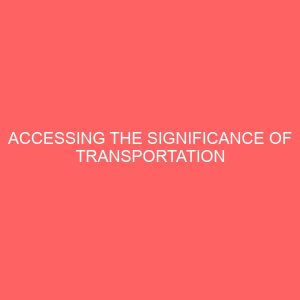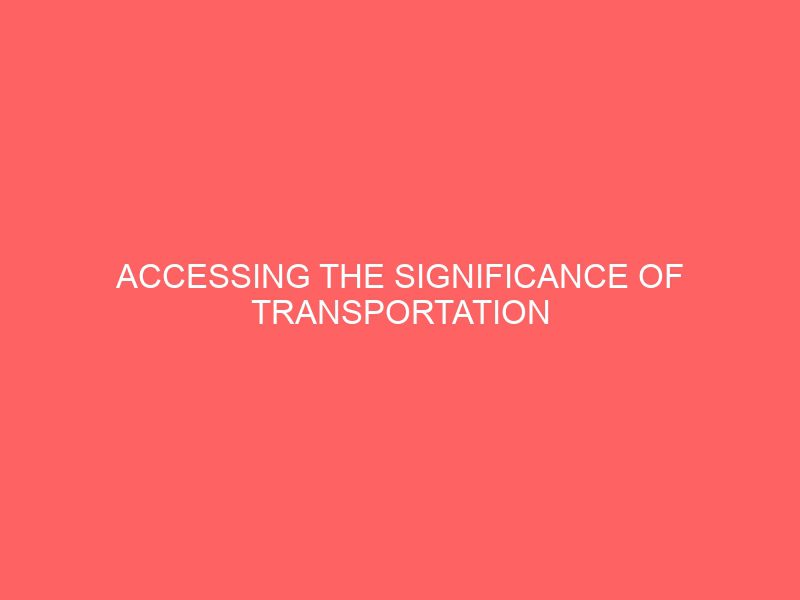Description
CHAPTER ONE
1.0 INTRODUCTION
According to Iwena (2000) in his book Essential Geography” describe Tourism as the phenomena, which involve the visiting of people to places of interest where they can relax, derive pleasure and entertainment.
Tourism is a basic means of attracting visitors to appreciate the material and human potentials that abound in such a place and this is further enhanced via transportation if properly harnesses can be utilised for the development and progress of a place.
Tourism may be seen to consist of a sense of encounters in which visitor interact with the host. Thus, it simply defines as the movement of people from their origin to places of destination for recreational purposes. The main point to be noted from the brief description above is that it is concerned with how man travels from one place to another for leisure recreational purposes.
According to Ogunlade (2004) states that tourism is God’s own given gift to man in the sense that any tourist attraction centre is beautiful, thrilling and marvellous sight to behold which leave you thinking of how great God is to Mankind.
1.1 BACKGROUND OF THE STUDY
According to Ogunlade (2005) states that the journey of Nigeria Tourism began September 25th 1962 when the Government took its first moved by establishing the Nigeria Tourism Association ( NTA).
The NTA a government body primarily charged with the responsibility of developing and promoting tourism in Nigeria. Mean while a decree 54 of 1976 was promulgated due to the fact that NTA could not meet the expected challenges. Therefore the Nigeria Tourism Board (NTB) was established which further led to the establishment of the Nigeria Tourism Development corporation (NTDC) which is the government parastals and at present as a co-ordinating body in Nigeria.
According to Ogunlade (2005), In July 1990 a new tourism policy was launched by the Federal Government which further explained the reason why both the public and private sectors should get involve in the tourism industry. Among these public and private sectors and other bodies that were established value this policy was the Directorate of food, Road and Rural Infrastructure (DFRRI) and the mass transits system to see how the rural areas that harbour most of our tourist product and potential can be made accessible to facilitate intrastate and interstate travels.
1.2 STATEMENT OF PROBLEM
Tourism and transportation sectors have great concern over the increasing fall of state affairs which has be on blamed on the following.
Tourism in Nigeria has suffered a lot of set back during the last few years due to a lot of factors such as frequent ethnic and religions clashes and hostage taking for example in oil producing areas, which have tampered with the security system of the nation.
Furthermore, available roads to most of our attractions are not motorable, lack of electricity and potable accommodation is a luxury in most of our resorts while most of them are still without communication facilities despite the advent of Global system mobile communication in the country lack of awareness programme to encourage people to visit places. Thus, inadequate funds for rehabitation of facilities.
1.3 PURPOSE OF THE STUDY
As the tourism industry is of rapid growing segment of today’s economy and consideration have been given to the importance of transportation on tourism only. Therefore, the purpose of this study centred on the following.
It is also aimed at looking into the various problems that face the effective uses of transportation system and how these problems can be solved. The significance of transportation system in tourism industry will be adequately highlighted.
Finally, it is hoped that through this study government and the private sector would see the need to provide the necessary facilities/ resources for effective transportation in tourism industry.
1.4 SIGNIFICANCE OF THE STUDY
The importance of the study will facilitate the significance of transportation system in tourism development.
It will also stimulate researcher (s) to further investigate way of improving transportation system in tourism industry.
Finally, the research will tend to highlight the relationship between transportation system and the tourism industry.
OBJECTIVES OF THE STUDY
The main objective of this study to access the significance of transportation system in the tourism industry especially in Ikeja Metropolis, Lagos State. The specify objectives include the following:
- To examine if there is really any significant relationship between transportation and tourism.
- To investigate if government supports the tourism industry with transportation and good roads.
- To examine if the issues with transportation can affect the tourism industry.
1.5 RESEARCH QUESTIONS
The following research questions were stated to guide this study:
- Is there any relationship between transportation and tourism?
- Does government participation be encouraged on the transportation industry?
- Does the extent of transport development in Nigeria determine that of tourism?
1.6 RESEARCH HYPOTHESES
The following research hypotheses were formulated to guide to guide this study.
HYPOTHESIS 1
H0: There is no significant relationship between transportation and tourism in Nigeria.
H1: There is significant relationship between transportation and tourism in Nigeria
1.7 SCOPE OF THE STUDY
The research will be limited to Ikeja metropolis in Lagos state due to time factor and finance.
Thus, in Ikeja metropolis, the determinants of transportation system, the importance of transportation systems in tourism development and the relationship between transportation system and tourism industry shall also be discussed.
1.8 DEFINITION OF TERMS
Transportation: A system set up by the government or private organization to move people from one place to another.
Tourism: An industry that allows people from near, far and wide to visit destinations of interest.
Government: A group of people elected to rule and make decisions on behalf of their subjects








Reviews
There are no reviews yet.